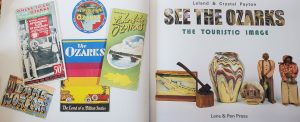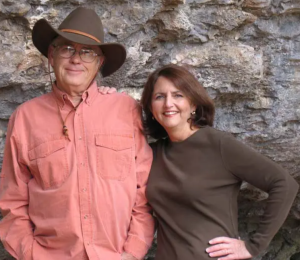MSU Libraries Acquires One-of-a-Kind Ozarks Collection from Crystal and Leland Payton
 Crystal and Leland Payton have invested around 40 years, countless hours, and extensive expertise in developing a one-of-a-kind collection featuring more than 5,000 Ozarks cultural artifacts. That work will now benefit generations of Ozarkers to come through Missouri State University Libraries, which has acquired the Payton Ozarks Collection.
Crystal and Leland Payton have invested around 40 years, countless hours, and extensive expertise in developing a one-of-a-kind collection featuring more than 5,000 Ozarks cultural artifacts. That work will now benefit generations of Ozarkers to come through Missouri State University Libraries, which has acquired the Payton Ozarks Collection. “I think we’re on the same wavelength. What is happening with MSU Libraries is exciting, and I’m thrilled our collection can be part of this movement for regional recognition,” says Crystal Payton, referencing Ozarks-preservation initiatives currently underway through the library.
“No one could be a better custodian,” adds Leland Payton.
It’s a decision that also pleases representatives at MSU Libraries.
“We are proud and pleased to have Crystal and Leland Payton’s collection at MSU Libraries. Its depth represents a treasure trove of information about the region, both for those of us who are interested today, but also for years into the future,” says Tom Peters, dean of MSU Libraries and director of the Ozarks Studies Institute (OSI). “The time and energy the Paytons have invested in putting these resources together in one place is something that will have a lasting impact on the study of the Ozarks region.”
 The collection includes six categories of Ozarks artifacts: Memorabilia, Souvenirs, Art, Hillbilly, Dams and Water Resources, and References.
The collection includes six categories of Ozarks artifacts: Memorabilia, Souvenirs, Art, Hillbilly, Dams and Water Resources, and References. Ultimately, the collection supplied illustrations for the half-dozen books the Paytons have written about the region. There was no other source of such imagery, the Paytons say; at the time, libraries and museums did not acquire and curate popular culture and commercial materials.
Within those groupings are hundreds of real-photo postcards, many shot by famed photographer George Hall, which display scenes of a long-gone Ozarks. There are promotional pieces and artifacts reflecting the rise of Lake of the Ozarks and Shepherd of the Hills Country, the latter how tourists first knew the Branson area.
Photographs and scrapbooks, reel-to-reel film, souvenirs, plates, banners, wood slabs adorned with bucolic Ozarks scenes and other memorabilia share a different time. There are pieces of roadside pottery, once common along Ozarks roadways, that have become popular with collectors today. Artwork from regional artists and original Paul Webb “Mountain Boy” cartoons – likely included in early Esquire magazine – are also available for study within the collection.
“These items are important to understand because they were often part of people’s daily life,” says Peters. “They offer insight and perspective on what it was like to live in the Ozarks during the early part of the 20th century.”
MSU Libraries will gradually digitize many of the items and make them available to researchers online.
“We believe that the best way to share these items is to have them available to people when and how they want to use them,” says Peters. “Digitizing items is the best way to do that, allowing the greatest ease of access, and from anywhere on earth.”
The acquisition of the Payton Ozarks Collection is only the latest in a series of efforts by MSU Libraries’ Ozarks Studies Institute around regional preservation and celebration.
The department recently saw the completion of a digitization project with UCLA Film and Television Archive to digitize more than 70 episodes of the Ozark Jubilee, a national television program that originated from Springfield in the 1950s. MSU Libraries is also serving as the lead partner for the Smithsonian Folklife Festival’s focus on the Ozarks, which will begin in June 2023 on the National Mall in Washington D.C.
Additionally, MSU Special Collections and University Archives – where the more rare and fragile items in the Payton Ozarks Collection will officially reside – houses specialized documents, artifacts and information around particular facets of regional history.
For more information about the MSU Libraries and the Ozarks Studies Institute, click here.